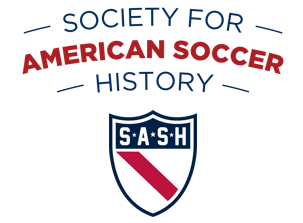Joe Barriskill was a complicated figure in American soccer of decades ago. He played an important part in shepherding American soccer through some dark times, but the manner in which he ruled the USSFA during his 28 years as its secretary made him considerably less than loved. One prominent American soccer writer, describing his first encounter with Barriskill, around 1960 in the USSFA’s cubbyhole of an office in New York, said a few years ago that Barriskill’s reply to his quite innocuous first question was to snarl: “Why do you want to know that?” This was not an out-of-character response.
Barriskill, who was born and raised in Ireland, came to the United States in 1910, when he was 21 years old, as a salesman for an Irish linen company. He did not play a part in the founding of the U.S. Football Association in 1913, but he was a friend of the USFA’s first president, Gus Manning, and gradually became involved in USFA affairs. He was president of the USFA from 1934 to 1936, but that was only a prelude. He became general secretary of the USFA in 1943, two years before it changed its name to the U.S. Soccer Football Association. He stayed in that position until 1971, not retiring until he was in his 80s and had worked with 13 different federation presidents. Those presidents may have been formally the head of the organization, but it was Barriskill who ran the show on a day-to-day basis.
By the latter part of Barriskill’s reign at the USSFA, he was gone from the linen company, and was supplementing his earnings from the USSFA by working in various jobs at Yankee Stadium. There have been descriptions of him as an usher, a ticket-taker and a peanut vendor.
Those jobs may have been small, but at the USSFA, Barriskill was a force to be reckoned with, as people who displeased him found out. One such was Jackie Hynes, a forward who played in the American Soccer League from 1938 until 1960. Hynes was one of the stars of the United States national team during the World Cup qualifying tournament in Mexico City in 1949. He played in all four of the United States’ games, and also wrote a post card home to a friend in New York City in which he made some rather mild remarks about how the team could be playing better. Hynes’ remarks were repeated in the friend’s newspaper column. Barriskill found out about them. Hynes never played for the United States again. Throughout the middle of the 20th century, Barriskill laid down the law about what happened in American soccer – and what didn’t.
Barriskill’s greatest value to the USSFA may have been his determination to see that its finances stayed on the positive side. He was a familiar sight at games where the USSFA was owed a share of the gate receipts, making sure that the USSFA wasn’t shortchanged.
There were a lot of people in Barriskill’s lengthy era who had run-ins with him over one matter or another. He was anything but smooth, someone who might be out-of-place in the more glamorous world to which American soccer has risen today. Nevertheless, he was perhaps more responsible than any other person for helping American soccer to stay alive through the dark ages that preceded that rise.
A version of this article first appeared on Roger’s Big Soccer blog on Feb. 14, 2012.
